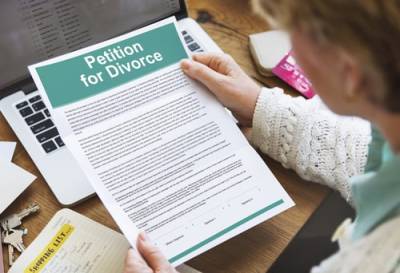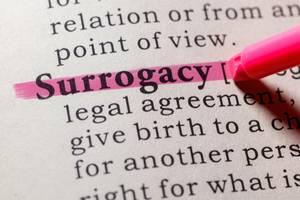Recent Blog Posts
Should I File For Divorce if I Think My Spouse May Be Planning To Divorce Me?
 Maybe your spouse said something directly. Maybe it is only a hunch. Whatever your reason for suspecting divorce papers may be heading your way, it is common to feel panicked and unsure of which steps to take next. Having conflicting feelings is totally normal during the pre-divorce phase, but it is still important to strategize carefully so you do not end up at a disadvantage if your spouse does end up filing for divorce. If you are wondering whether you should file for divorce first, read on and then contact our excellent team of Cook County divorce attorneys.
Maybe your spouse said something directly. Maybe it is only a hunch. Whatever your reason for suspecting divorce papers may be heading your way, it is common to feel panicked and unsure of which steps to take next. Having conflicting feelings is totally normal during the pre-divorce phase, but it is still important to strategize carefully so you do not end up at a disadvantage if your spouse does end up filing for divorce. If you are wondering whether you should file for divorce first, read on and then contact our excellent team of Cook County divorce attorneys.
Can My Spouse File For Divorce Without Telling Me?
While it certainly does not feel good to be surprised by a knock on the door from a sheriff serving divorce papers, your spouse can file for divorce without telling you first. As long as one of you has lived in Illinois for at least 90 days, you can file for divorce under Illinois law. Your spouse does not even have to claim that you are at fault; “irreconcilable differences” is the only reason spouses can give for getting divorced in Illinois.
If I Made More Money in Our Marriage, Do I Get More in Our Divorce?
 Although it may not seem romantic, marriage is a financial partnership. This is never more clear than during divorce, when a couple who has combined their incomes and assets for years now has to split them up. The end of a marriage has major financial implications for both partners and it is natural to have many questions about what happens to your money in a divorce. One of the most common questions Illinois divorce attorneys get is whether a spouse who has made more money will get to keep more of the marital estate. In community property states, assets are divided 50/50; however, Illinois does things a little differently.
Although it may not seem romantic, marriage is a financial partnership. This is never more clear than during divorce, when a couple who has combined their incomes and assets for years now has to split them up. The end of a marriage has major financial implications for both partners and it is natural to have many questions about what happens to your money in a divorce. One of the most common questions Illinois divorce attorneys get is whether a spouse who has made more money will get to keep more of the marital estate. In community property states, assets are divided 50/50; however, Illinois does things a little differently.
How is Property Divided in an Illinois Divorce?
Illinois is a so-called “equitable division” divorce state, meaning that courts are more focused on determining whether an asset settlement is fair rather than exactly equal. Courts encourage couples to create asset settlements on their own, using the help of a mediator if necessary.
Three Tips for Preparing for a High-Conflict Divorce
 Many people avoid beginning the Illinois divorce process because they have such a contentious relationship with their spouse and they only anticipate things will get worse during the divorce. Unfortunately, bitter relationships rarely end with amicable divorces, and many spouses’ worst fears are confirmed once the divorce begins.
Many people avoid beginning the Illinois divorce process because they have such a contentious relationship with their spouse and they only anticipate things will get worse during the divorce. Unfortunately, bitter relationships rarely end with amicable divorces, and many spouses’ worst fears are confirmed once the divorce begins.
However, a great divorce attorney can help you get a fair divorce decree, even if your spouse is determined to hide marital assets, fight your claims for spousal maintenance, or argue over who should have custody of the kids. Here are three tips for preparing for a high-conflict divorce; read through them and then contact a divorce attorney with experience advocating for clients during contentious divorces.
Know Your Finances
What Can I Do if I Believe Someone Is Wrongfully Claiming I Am the Father?
 Someone contacting you to inform you that you are the father of an unplanned or unwanted pregnancy can be a shocking experience. While some men are excited to learn they are going to be a father, others are understandably upset to learn that someone is trying to hold them responsible for a child they do not want or do not believe is theirs. Being a father is a tremendous responsibility, both in terms of its ethical and legal implications. If you are being asked for child support and are skeptical of the claims about the child’s paternity, contact an experienced family law attorney who can help.
Someone contacting you to inform you that you are the father of an unplanned or unwanted pregnancy can be a shocking experience. While some men are excited to learn they are going to be a father, others are understandably upset to learn that someone is trying to hold them responsible for a child they do not want or do not believe is theirs. Being a father is a tremendous responsibility, both in terms of its ethical and legal implications. If you are being asked for child support and are skeptical of the claims about the child’s paternity, contact an experienced family law attorney who can help.
How is Paternity Established in Illinois?
Establishing paternity for a married couple’s child is simple: the husband is presumed to be the father. But if you are married and you suspect your wife may have conceived your child with another man, you can overcome the presumption that you are the father by requesting genetic testing that shows otherwise. Generally speaking, if there is any question about whether a man is a child’s father, genetic testing can be requested by either the mother or the presumed father or ordered by a court.
Feeling Stuck in a Rut After Your Illinois Divorce? Try These Four Tips
 Even in the most amicable divorces, the divorce process is not easy and it is normal to feel overwhelmed with emotions when the divorce is over. You may feel grief and relief at the same time, as well as periods when you vacillate between self-doubt and confidence that you made the right decision. Feeling and expressing these feelings is normal and healthy, but sometimes people get stuck in their grief and cannot process it in a healthy way. If you have recently gotten divorced or are considering divorce in Illinois, here are some tips to help you recover from the grieving period.
Even in the most amicable divorces, the divorce process is not easy and it is normal to feel overwhelmed with emotions when the divorce is over. You may feel grief and relief at the same time, as well as periods when you vacillate between self-doubt and confidence that you made the right decision. Feeling and expressing these feelings is normal and healthy, but sometimes people get stuck in their grief and cannot process it in a healthy way. If you have recently gotten divorced or are considering divorce in Illinois, here are some tips to help you recover from the grieving period.
What is Divorce Grief?
People are often ashamed to admit how much grief they feel after a divorce, especially if they initiated the divorce proceedings. But divorce is a tremendous loss in many ways - your identity, your relationship with your children, your community, and even your friends may be lost or dramatically changed. And, of course, your spouse is no longer part of the picture, making the future uncertain. Grief is a natural process that allows us to work through our feelings of loss and move forward into the next stage of our lives, ideally with some room in our hearts for new experiences.
Five Common Reasons Long-Term Marriages Dissolve
 When Bill and Melinda Gates announced their intention to divorce, many people who hardly knew a thing about the couple besides their tremendous technological and philanthropic achievements were stunned. Despite the well-known statistics, people simply do not expect couples who are married for so long to get divorced. But many couples do divorce after spending two, three, and even four decades together. Experts say that changing social norms around why people stay in marriages and what reasons are acceptable for getting divorced have contributed to higher rates of divorce later in life. Here are five of the most common reasons couples get divorced after long-term marriages in Illinois.
When Bill and Melinda Gates announced their intention to divorce, many people who hardly knew a thing about the couple besides their tremendous technological and philanthropic achievements were stunned. Despite the well-known statistics, people simply do not expect couples who are married for so long to get divorced. But many couples do divorce after spending two, three, and even four decades together. Experts say that changing social norms around why people stay in marriages and what reasons are acceptable for getting divorced have contributed to higher rates of divorce later in life. Here are five of the most common reasons couples get divorced after long-term marriages in Illinois.
Money
Many couples fight constantly about money. Because behaviors around money usually have more to do with innate character traits, conflicts around money are not easily resolved and tend to continue over time. When a couple has been married for decades, retires, and has the financial stability to separate from their partner, they may find that disagreements over money are simply too stressful to overcome any longer.
Three Reasons Why You Should Avoid Buying New Property Before Your Illinois Divorce is Finalized
 Once you know you are going to get divorced, planning for the future is only natural. Scheduling activities with your kids, deciding how to divide your personal belongings, and finding a new residence can all begin happening well before an Illinois divorce is finalized. But what happens if one parent moves out of the marital home and does not want to rent? Is it possible to purchase a home before a divorce is finalized so you can make the transition to life after divorce as easy as possible? Read on to find out.
Once you know you are going to get divorced, planning for the future is only natural. Scheduling activities with your kids, deciding how to divide your personal belongings, and finding a new residence can all begin happening well before an Illinois divorce is finalized. But what happens if one parent moves out of the marital home and does not want to rent? Is it possible to purchase a home before a divorce is finalized so you can make the transition to life after divorce as easy as possible? Read on to find out.
Is it Legal to Buy a New House Before Divorce?
There is no law against buying a second home under your own name while you are still married. However, there are several reasons why doing so may not be a good idea. These include, but are not limited to:
-
Dissipation claims - Using marital funds for reasons that do not benefit the marriage can expose you to asset dissipation claims. Even if such a claim is untrue, it can be expensive and time-consuming to argue that you did not dissipate marital assets when buying your home.
How Does Having a New Partner Change the Divorce Process in Illinois?
 Most people choose a person to marry in the belief that they will remain partners for life. But as we grow, we realize things about ourselves we did not know when we got married, which can make someone who was a good fit when we were younger far less of a good fit as time goes on. In addition, people and circumstances change, and many married people somewhat unexpectedly find themselves in another, much happier relationship before their Illinois divorce is finalized or even initiated.
Most people choose a person to marry in the belief that they will remain partners for life. But as we grow, we realize things about ourselves we did not know when we got married, which can make someone who was a good fit when we were younger far less of a good fit as time goes on. In addition, people and circumstances change, and many married people somewhat unexpectedly find themselves in another, much happier relationship before their Illinois divorce is finalized or even initiated.
While only you can decide the right course for your life, both in terms of whether seeking a new partner or a divorce is right for you, it is important to know that having a new partner can potentially impact the divorce process. If you are anticipating divorce and already have a new partner, read on to learn three things you should be aware of.
You May Not Receive Alimony
Alimony, known in Illinois as “spousal maintenance,” is only available to divorced spouses who need time to get on their feet financially after the marriage ends. If a divorcee moves in with a new partner right away, alimony payments are terminated or may never even be a possibility.
Can Asset Tracing Help Me Find Assets My Spouse is Hiding in Our Illinois Divorce?
 One of the hardest parts of getting divorced in Illinois is dividing marital property. Because Illinois divorce law requires marital assets to be divided fairly, rather than equally, there can be some question about what a fair division looks like. This is especially true when one or both spouses are high earners and share a high net worth. To avoid heavy financial losses in a divorce, some spouses try to hide assets to protect them from division.
One of the hardest parts of getting divorced in Illinois is dividing marital property. Because Illinois divorce law requires marital assets to be divided fairly, rather than equally, there can be some question about what a fair division looks like. This is especially true when one or both spouses are high earners and share a high net worth. To avoid heavy financial losses in a divorce, some spouses try to hide assets to protect them from division.
There are many ways to hide assets and, once hidden, they can be very difficult to track down. In addition to hiding assets, spouses may also try to lay claim to private property by saying it is marital property. If you are getting divorced and are concerned that your spouse is hiding or manipulating assets, get help from an experienced divorce attorney who can recommend financial professionals who may be able to help.
How Does Asset Tracing Work?
Five Common Questions About Surrogacy in Illinois
 Many would-be parents face a difficult uphill struggle when trying to create the family of their dreams. Thanks to modern technology, many options are available to help those who cannot conceive on their own, and the method you choose will depend on your preferences, your budget, your health, and many other factors.
Many would-be parents face a difficult uphill struggle when trying to create the family of their dreams. Thanks to modern technology, many options are available to help those who cannot conceive on their own, and the method you choose will depend on your preferences, your budget, your health, and many other factors.
One method that proves effective for many people is using a surrogate mother who carries a baby on their behalf. There is more than one type of surrogacy and many different agencies are available to help. However, the process can be legally complex and it is important to make sure you have an experienced Illinois attorney who can help you create an airtight surrogacy agreement. For answers to common questions about surrogacy in Illinois, read on - then contact one of the skilled family law attorneys with A. Traub & Associates.
What Are the Different Types of Surrogacy?

















